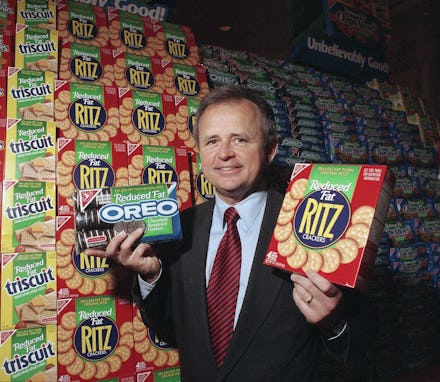These 5 photos prove that packaged "health" foods are a total hack

When it comes to food labels, healthful-sounding marketing words are a dime a dozen. Phrases that don't mean anything — like "natural" — can dupe consumers into thinking products are healthier than they actually are.
A new study confirms just how deceitful some marketing terms can really be. Published in the Journal of Academy of Nutrition and Dietetics, the study reveals that marketing phrases like "low-fat" and "low-sugar" don't reflect the actual nutritional quality in a given product.
"In many cases, foods containing low-sugar, low-fat or low-salt claims had a worse nutritional profile than those without claims," Lindsey Smith Taillie, lead investigator for the study and a research assistant professor in the department of nutrition at UNC's Gillings School of Global Public Health, told UNC News.
Sadly, that's not the worst of it. Taillie noted products that "tend to be high in calories, sodium, sugar or fat may be more likely to have low-content or no-content claims." In other words, the presence of health marketing claims might indicate the product isn't healthy. Confused? Us, too.
"In many cases, foods containing low-sugar, low-fat or low-salt claims had a worse nutritional profile than those without claims." - Linsey Smith Taillie, UNC Department of Nutrition
Basically, "reduced" means the product contains less of a certain nutrient compared to the original food. But that's just for one nutrient. Food companies might add more of a different nutrient (for example, sugar or sodium) that are still not so great for your health. A previous study found low-fat products had higher amounts of sugar than original products — not really ideal for consumers who believe they're making the healthier choice.
Plus, the health claims could distract from the fact these products don't deserve any sort of link to the idea of healthy at all. Taillie noted low-fat granola is a good example.
"Despite being low-fat, 100g of low-fat granola contains 384 calories (or nearly 20% of daily recommended amount of calories), including five grams of fat but more importantly, 29 grams of sugar," Tailie said in an email. "Considering this is only one meal, this is quite high in calories and sugar."
Need some more proof that these marketing claims should be a warning sign to more closely inspect overall nutrition? Here are five photos that prove "low" and "no" claims on products aren't as healthy as they seem. The products below boast about having relatively lower amounts of one nutrient, yet they have relatively higher amounts of other nutrients.
Peanut butter
Talk about peanut bummer ... choosing reduced fat Jif means you'll save a few grams of fat compared to the regular version, but there are several downsides. You'll be eating an extra gram of sugar (that's 33% more) and seven more grams of carbs. (Oh yeah, did we mention 65 more grams of sodium, too?)
Cookies
Choosing reduced fat Chips Ahoy over the regular cookies will save you two grams of fat per serving of three cookies, but you'll be consuming two more grams of carbs and 30 more milligrams of sodium. Both cookies still have 11 grams of sugar per serving, which is a significant amount of the sweet stuff. The American Health Association recommends no more than 25 grams of added sugars per day for women and 36 grams of sugar for men.
Chocolate milk
Depending on which brand you buy, you might be consuming more sugar if you opt for the lowfat version of chocolate milk. Turkey Hill's 1% chocolate milk has four grams more sugar than their chocolate drink made with whole milk.
Blueberry muffins
Ordering a "reduced fat" blueberry muffin from Honey Dew Donuts will still deliver a megadose of sugar. The 42 grams of sugar is almost double the daily recommended sugar intake for women — so this so-called "reduction" doesn't help with much. There are several disadvantages to the reduced fat version including more sodium and more carbs compared to the regular muffin.
Cream cheese
The low-fat version of Philadelphia cream cheese has 75 mg more sodium than the regular version. (And an extra gram of sugar!) Consuming excess sodium has been linked to high blood pressure and kidney disease, among several other health conditions.
Moral of the story here? Read your food labels, and don't be charmed with healthy-sounding names.